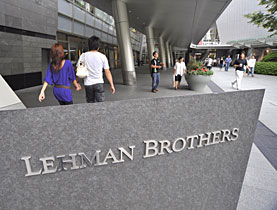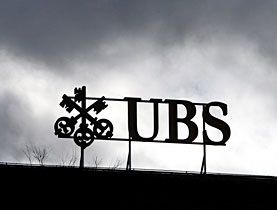Financial failures infect world stock markets

The failure of three United States financial institutions on Monday has sent shockwaves through the world's markets, putting the spotlight once more on Swiss banks.
The Swiss Market Index (SMI) rallied at the end of Monday to close down nearly four per cent. Shares in Switzerland’s largest bank, UBS, dropped 15 per cent while Credit Suisse and other banks also dived.
Stock markets around the world sank into the red as panic set in about the bankruptcy of US investment bank Lehman Brothers and the knockdown sale of its Wall Street rival Merrill Lynch. The world’s largest insurer, AIG, also had to go cap in hand to the Federal Reserve for an emergency bailout.
“This is a once-in-a-century event and there is no proof that we are at the end of it,” Didier Cossin, professor of banking and finance at Lausanne’s IMD business school, told swissinfo.
Hans Geiger, a professor at Zurich University’s Swiss Banking Institute predicted more turmoil to come for the remainder of this year and well into 2009.
“The US financial house is in flames,” he said. “What we are currently seeing is a desperate blaze sweeping through the American sector. This will not be the last of these flames.”
Huge exposures
The latest twist in the global crisis has split opinion on whether Switzerland’s financial institutions will emerge intact. UBS has already lost $42 billion (SFr47 billion), forcing it to break up its One Bank strategy; Credit Suisse has also had its fingers burned.
The Swiss National Bank on Monday injected twice the amount of liquidity into the market than normally.
“In a normal situation, we have SFr4 – 5 billion in the system,” a vice-president of the Swiss National Bank, Thomas Jordan, told Swiss television. “Today, however, there was more than SFr8 billion.”
The Federal Banking Commission, Switzerland’s banking watchdog, gave assurances that Swiss banks had easily enough capital to deal with the latest downturn. Finance Minister Hans-Rudolf Merz was also moved to give his personal vote of confidence in UBS.
“The events in the US have no direct effects on our economy, ” Merz said on Monday, adding that UBS had stocked up its capital in time “and is prepared for the current turbulence”.
But Cossin is not so convinced that the main Swiss banks will escape any further ravages.
“It is intriguing to see if this remains a US problem or if some European banks come under pressure, forcing the political authorities to help them out. Clearly there are still huge exposures out there, notably in Switzerland,” he told swissinfo.
“And there is very little transparency so we don’t know exactly where these positions are.”
Doubts remain
One good sign is that UBS and Credit Suisse have joined a global consortium of ten major banks that have between them pledged $70 billion to an emergency fund that could be used to bail out stricken financial institutions.
However, media reports at the weekend suggested that UBS might not be entirely out of the woods yet. The SonntagsZeitung newspaper reported on Sunday that UBS would write down another $5 billion in exposures to bad investments in the second half of 2008.
The Financial Times also said the bank hoped to resolve a damaging dispute with the US authorities over its alleged complicity in tax evasion in time for its emergency shareholders’ meeting on October 2. The bank will use the event to present its future strategy.
swissinfo, Matthew Allen in Zurich
The world’s financial markets were rocked by bad news from a trio of big players in the US on Monday.
Investment bank Lehman Brothers collapsed under the weight of subprime mortgage debt and filed for bankruptcy after failing to find a buyer. The news rang alarm bells around the globe as other banks calculated how much money they would lose from deals previously struck with the 158-year-old institution.
On the same day, investment bank Merrill Lynch was forced to accept defeat and was sold at a knockdown price of $50 billion to Bank of America. The deal mirrored the humiliating sale of Bear Stearns to JP Morgan in March.
The world’s largest insurer, AIG, petitioned the Federal Reserve for a $40 billion handout to shore up its shaky finances.
The problems were sparked months ago by the collapse of the US subprime mortgage industry that lent money to people with poor credit ratings to buy homes. The financial markets traded these loans around the world and suffered huge losses as the US housing market dried up and home prices dropped.

In compliance with the JTI standards
More: SWI swissinfo.ch certified by the Journalism Trust Initiative



You can find an overview of ongoing debates with our journalists here. Please join us!
If you want to start a conversation about a topic raised in this article or want to report factual errors, email us at english@swissinfo.ch.